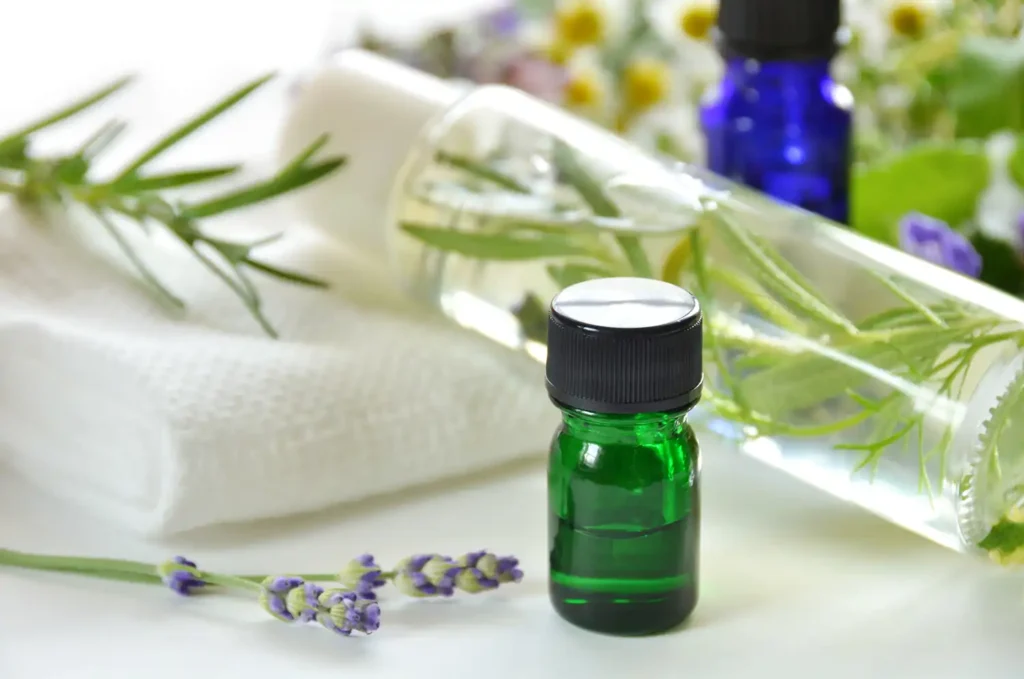The Importance of Restful Sleep
Sleep is essential to our daily lives, yet many people underestimate its importance. In today’s fast-paced world, it can be tempting to sacrifice sleep in order to accomplish more tasks or meet deadlines. However, the adverse effects of sleep deprivation on both physical and mental health cannot be ignored. Not getting enough sleep weakens the immune system and raises the risk of diseases like diabetes and heart disease. It also affects cognitive function and contributes to mood disorders such as depression and anxiety.
Getting enough quality sleep is crucial for our overall well-being. During sleep, our bodies repair and regenerate cells, our brains consolidate memories and process emotions, and our immune system strengthens. These vital processes are disrupted without adequate sleep quality, decreasing physical and mental health. Therefore, it is important to prioritise sleep quality and make it a priority in our daily lives.
Understanding The Science Behind Essential Oils & Sleep
Essential oils have been used for centuries for their therapeutic properties. These concentrated plant extracts contain volatile compounds that can profoundly affect our physical and emotional well-being. Many essential oils can help encourage relaxation and calmness, making getting a good night’s sleep easier.
Essential oils work by interacting with the brain and parasympathetic nervous system through inhalation and topical application. Inhaling essential oils activates the olfactory system, which is connected to the brain’s limbic system. The limbic system is responsible for regulating emotions, memory, and arousal. By inhaling essential oils, we can directly influence our emotional state and ability to relax.
Research has also shown how essential oils can have a sedative effect on the central nervous system. Other oils will help to keep you asleep and reduce the incidence of early morning wakings. For example, Lavender essential oil has been found to increase slow-wave sleep, which is the deep, restorative stage of sleep. Other essential oils like Chamomile and Bergamot help reduce anxiety, enhance relaxation, and may benefit people who struggle to fall asleep due to stress or racing thoughts.
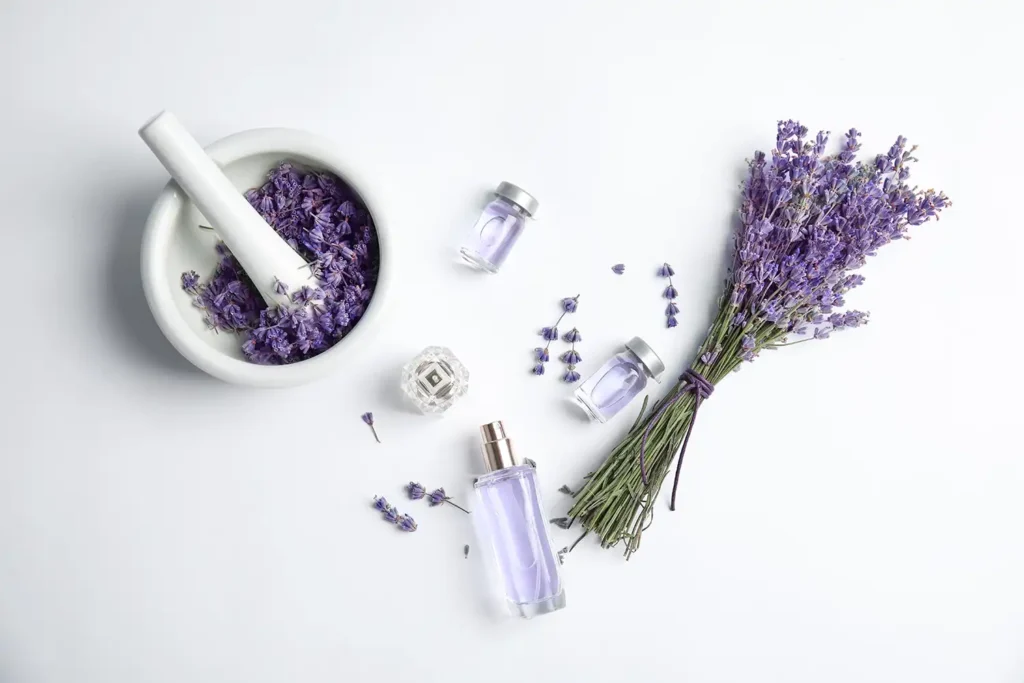

The Top Essential Oils For Promoting More Restful Sleep
Lavender Essential Oil
Lavender essential oil is commonly used for improving sleep, and Lavender aromatherapy bags are always popular at craft markets. Lavender oils calming and soothing properties make it an excellent choice for promoting relaxation and inducing sleep. Lavender oil has been shown to reduce anxiety, lower heart rate, and improve sleep quality. However, what is less commonly known is to use only a drop or two at bedtime, as using too much Lavender oil can actually be stimulating.
Chamomile Essential Oil
Popularly considered one of the best essential oils for sleeping, Roman Chamomile essential oil is an excellent stress buster. Often taken in the form of chamomile tea, the volatile oil molecules relax and calm you down. You need to use just a single drop on a tissue to put inside your pillow for the best results.
Bergamot Oil
Bergamot oil is derived from the peel of the bergamot orange and has a citrusy, floral scent. It is known for its mood-enhancing properties and can help reduce stress and anxiety. Bergamot can also increase relaxation and improve sleep quality. There has been research on postpartum depression as well.
Frankincense Oil
Frankincense oil is commonly used in aromatherapy to help with stress and anxiety. It promotes relaxation and can improve sleep. It slows breathing and drops the diaphragm, so you breathe deeper and slower. This automatically relaxes and oxygenates you, and its sedative properties make it an effective natural sleep aid.
Clary Sage Oil
Clary Sage oil has a calming effect on the nervous system, helping to reduce feelings of stress and anxiety. It reduces cortisol levels, which affect the circadian rhythms, promoting sleep. Clary Sage oil can also clear your mind of nagging thoughts that may keep you awake.
Cedarwood Essential Oil
The Cedrol content in Cedarwood oil reduces anxiety and stress and soothes the nervous system. Research conducted in Japan found that people with Cedarwood oil near their pillows had more prolonged and restorative sleep. The patient experience survey also showed that they also experienced fewer early wake-ups. This was the case with young, healthy adults as well as older adults with dementia.
Rose Essential Oil
This is such an expensive oil that not many people have experienced a true Rose essential oil. However, it becomes more affordable if bought diluted in alcohol or oil. It has such a strong aroma that the 10% diluted form is still very effective.
Inhaling it at bedtime caused a significant drop in breathing rate, pulse, blood pressure, and temperature. All of these are key indicators for deep and beneficial sleep. A patient experience survey showed that the test subjects rated themselves much calmer and relaxed.
Vetiver Essential Oil
This is another intensely aromatic oil with quite an earthy tone that is not to everyone’s liking. Moderation is key when using Vetiver oil. Even a little is sufficient to improve breathing and reduce inhaling during sleep. This can help with snoring, and research has shown how it affects brain wave patterns and alertness. In old texts, it is referred to as ‘The Oil of Tranquility’ for very good reasons.
Sandalwood Essential Oil
An interesting study showed the stress-busting ability of Sandalwood essential oil. It has wonderful grounding effects that promote improved sleep quality. Place a few drops of Sandalwood oil on a tissue and put it in your pillowcase for a lasting fragrance. Put the tissue in a clean jar the next morning. You can use it multiple times because Sandalwood oil lasts longer than other oils. A drop of Sandalwood oil can also be rubbed into your wrists – helpful for reducing anxiety.
Petitgrain Essential Oil
This beautiful oil is often used in perfumery for its dry, subtle fragrance. It calms the nervous system and reduces stress and anxiety. It has sedative properties and a light fragrance that helps promote relaxation for a good night’s sleep.
Marjoram Essential Oil
It might surprise you to see Marjoram oil listed, as most people only think of it as a culinary herb. The essential oil is not only warming and comforting, but it is also more potent than other oils like Lavender and Chamomile. It’s intensely relaxing and one of the best essential oils for improved sleep quality and insomnia. Marjoram oil also helps to lower blood pressure, which is a key factor in getting a better night’s sleep.
Valerian Essential Oil
Valerian oil is a highly effective remedy to improve sleep – despite its strong smell, which makes it less popular… The terpenes in Valerian oil are very effective at sedating a chattering mind. Valerian oil has been researched extensively. It has been found to improve sleep duration and help with insomnia caused by tension and anxiety.
Ylang Ylang Essential Oil
Ylang Ylang essential oil has a sweet fragrance and intensely floral scent known for its relaxing and sedative properties. The aroma can be intensely cloying and overpowering, leading to migraines for some people. Therefore, use the very smallest amount to get a better night’s sleep. It can help reduce anxiety, lower blood pressure, and promote sleep.
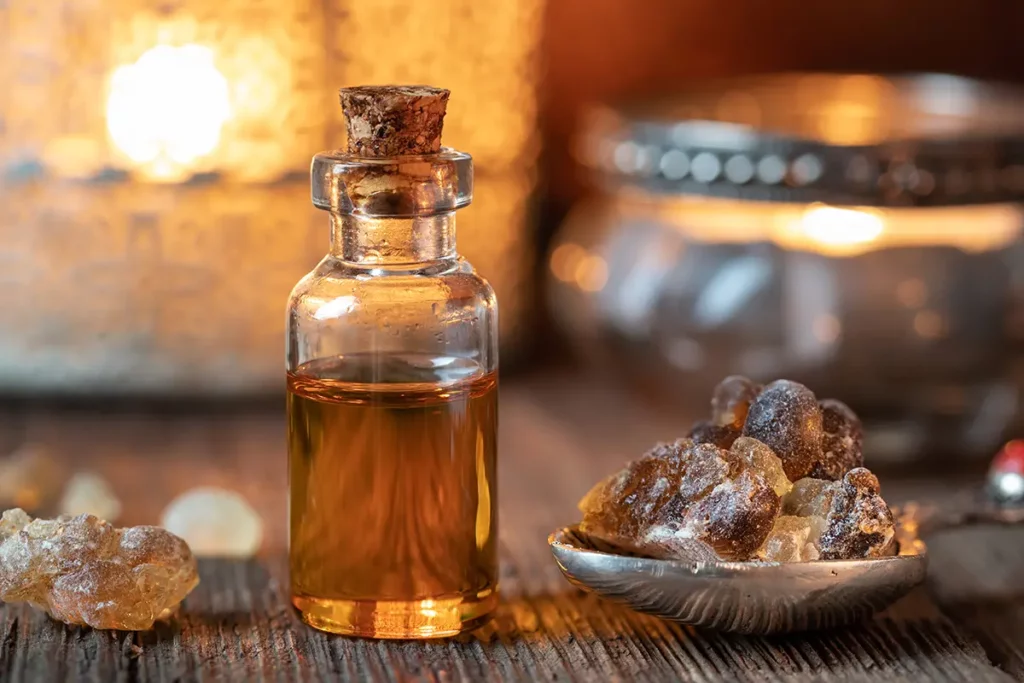
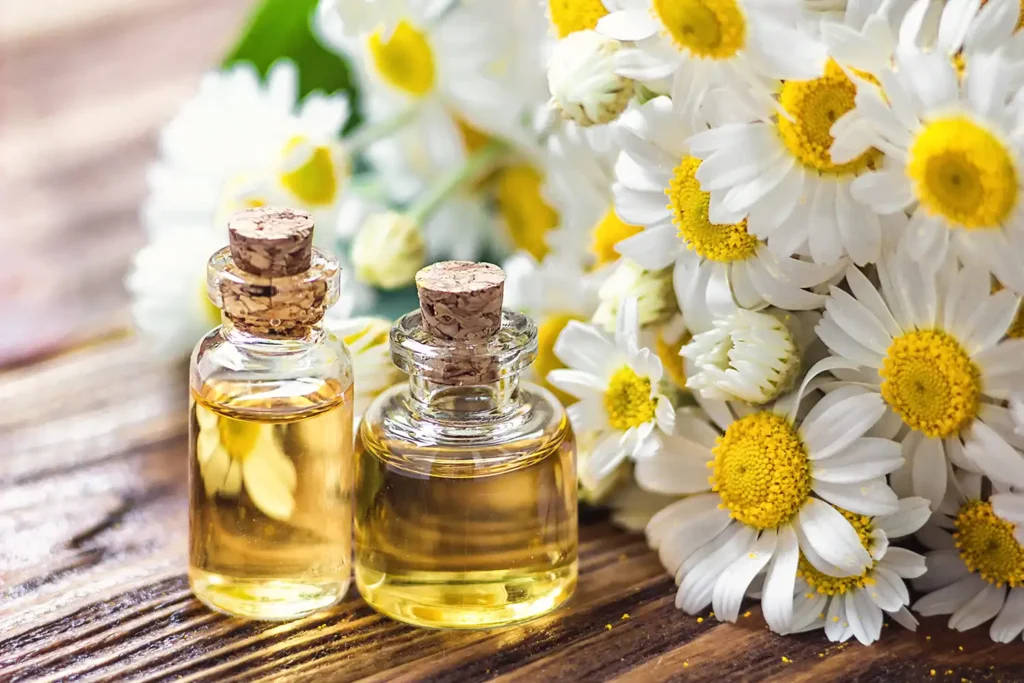
How To Use Essential Oils For Sleep: Diffusing, Topical Application, & More
There are several methods of using essential oils for sleep, depending on personal preference and the desired effect. The most common method is diffusing, which involves dispersing the essential oil molecules into the air using a diffuser. This method helps you gently inhale essential oils and allows the therapeutic properties to be absorbed by your body.
Please keep in mind the different aroma strengths of each of the oils. Many essential oils are very strong; for example, using too much Ylang Ylang will be cloying and unpleasant. Any diffused aroma should be subtle and not so strong as to keep you awake.
You can start by trying one essential oil that you like instead of making a complicated essential oil blend. To use essential oils for better sleep, add a few drops of your chosen oil to a diffuser filled with water and turn it on. The scent will fill the room, creating a calming atmosphere that promotes relaxation and sleep. Choose a diffuser that doesn’t heat the oil to maintain its therapeutic properties.
Another method of using essential oils for sleep is topical application. Mix them with a carrier oil like Coconut or Jojoba oil to avoid skin irritation before applying. This allows the oil to be absorbed into the bloodstream.
Mix a few drops of your desired oil with a carrier oil in a small glass bottle to apply essential oils to your skin. Apply the diluted oil to pulse points, such as the wrists, temples, or behind the ears. You can also massage the oil onto the soles of your feet or the back of your knees before bed.
Combining Essential Oils With Other Sleep-Promoting Practices, Such As Meditation & Yoga
Essential oils enhance sleep and relaxation techniques like meditation and yoga. You can enhance the power of both by using essential oils at the same time. This can result in a harmonious fusion that brings about deep relaxation and a calm mind.
During your post-yoga routine, you can use essential oils to encourage relaxation and assist recovery. After practice, apply a few drops of Lavender or Bergamot essential oil to your palms and rub them together. Take a moment to cover your nose with your hands and take a few deep breaths. Focus on the scent and let it help relax your nervous system.
The Benefits of Using Essential Oils For Sleep Instead of Traditional Sleep Aids
There are many benefits to choosing an essential oil for sleeping. They are natural, non-addictive, and safe when used correctly. They can be better than prescription and over-the-counter sleep aids because they are not addictive and have fewer side effects. It is important to research each oil for possible contraindications, especially if you have health complications such as blood pressure issues.
Essential oils can help to improve your sleep quality by promoting relaxation, reducing stress, and balancing the body and mind. They can help address the underlying causes of poor sleep, such as anxiety or racing thoughts, and promote overall well-being. They have unique properties that can help as a sleep aid and improve your sleep quality.
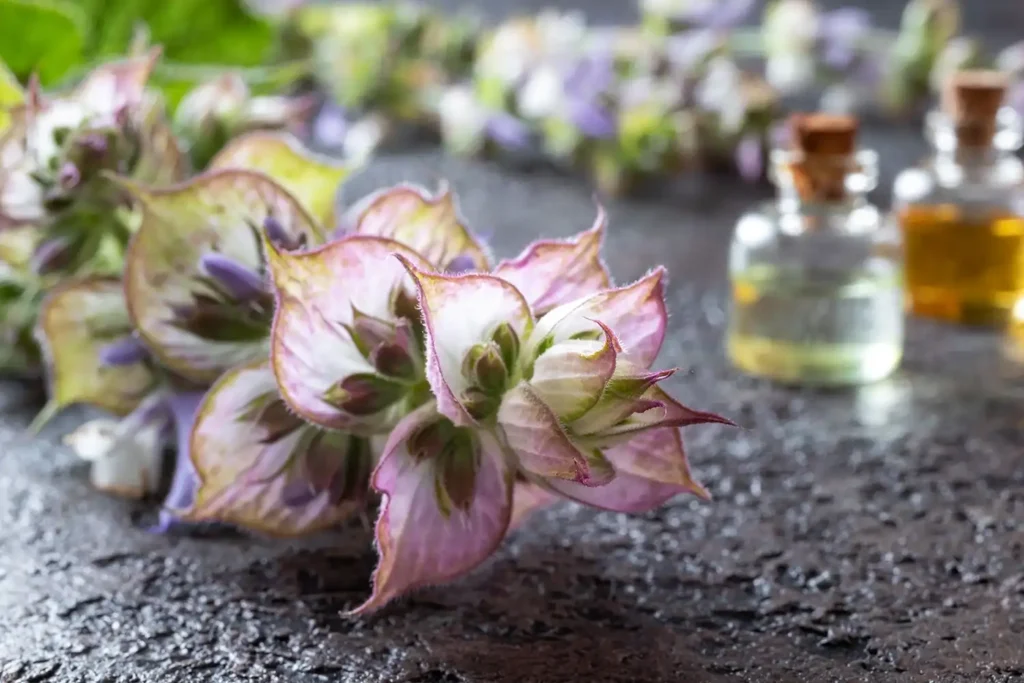
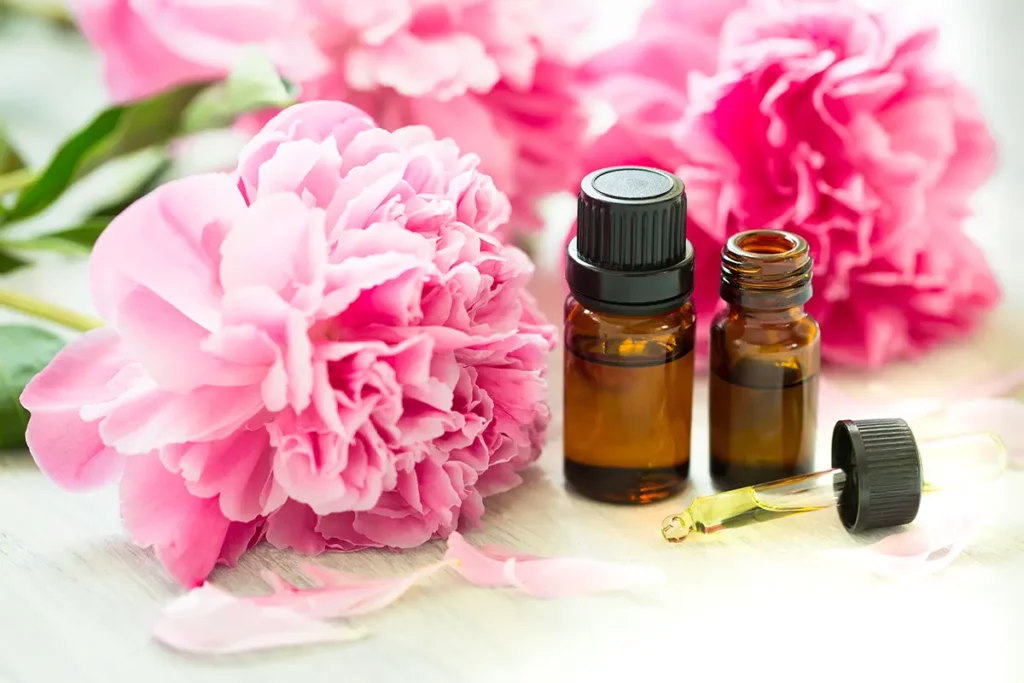
Tips For Creating a Relaxing Sleep Environment with Essential Oils
Creating a calming atmosphere in your bedroom is essential for promoting rejuvenating sleep. Here are some tips for using essential oils to create a relaxing sleep environment:
Use a high-quality diffuser: Invest in a diffuser that doesn’t heat the oil to preserve its therapeutic properties. Find a diffuser with a timer or automatic shutdown feature. This way, you can program it to run for a certain amount of time before bed.
Choose the right essential oils: Certain essential oils will appeal to you more than others. Experiment with different essential oils to find the best ones for you. Lavender essential oil, Roman Chamomile essential oil, Bergamot essential oil, Cedarwood essential oil, and Marjoram essential oil are some of the best essential oils for sleep.
Diffuse essential oils before bedtime: Start diffusing your chosen essential oil about 30 minutes before bed to create a calming atmosphere in your bedroom. This will help signal to your body that it is time to relax and prepare for sleep.
Keep the room cool and dark: Ensure your bedroom is cool, dark, and quiet. Use blackout curtains or a lavender aromatherapy eye mask to block out light. To block out noise, try earplugs or a white noise machine.
Create a bedtime routine: Establish a relaxing routine that includes diffusing essential oils. You can practice deep breathing exercises while watching TV, but avoid stimulating programmes, violence and thrillers. Even the news is best left until the next day. Some say the blue light from laptops and mobile phones can also keep you awake.
Sleep hygiene: Clean sheets at night are always the best because even fresh bedding can promote sleep. If you like the fragrance of Vetiver oil, put a drop or two into the final rinse compartment of your washing machine. This will subtlely imbue your sheets with a soft, calming fragrance. Enjoy a relaxing bath before slipping into those clean sheets for better sleep.
Enjoy a warm bath: A hot bath is very stimulating, so make sure it’s a warm bath to ensure you get a good night’s sleep. Mix a few drops of Cedarwood oil and Clary Sage oil with a tablespoon of carrier oil to lower blood pressure and reduce anxiety. Then, add it to your bubble bath. This will make the bath feel much more luxurious and is another excellent way of incorporating an essential oil topically. Use Peppermint oil and Eucalyptus oil to improve your breathing and sleep quality when congested.
Essential Oils for Specific Sleep Issues, such as Insomnia and Sleep Apnoea
Different essential oils can be used to address specific sleep issues for those coping with insomnia or sleep apnoea. Here are some examples of incorporating essential oils into blends for different sleep problems:
Insomnia: For those who struggle with insomnia, a blend of Lavender oil, Roman Chamomile oil, and Bergamot oil can be effective. Lavender oil relaxes and induces sleep, Chamomile oil reduces anxiety, and Bergamot essential oil helps calm the mind and reduce stress.
Sleep apnoea: Sleep apnoea is a condition characterised by pauses in breathing during sleep. A blend of Eucalyptus oil, Peppermint oil, and Vetiver oil can help promote the feeling of better breathing. Eucalyptus oil helps open the airways, Peppermint oil promotes clear breathing, and Vetiver improves breathing. Peppermint oil and Lavender oil also work well together. If you suspect that you have sleep apnoea, speak to your doctor about it. They might recommend using a CPAP (continuous positive airway pressure) machine.
Restless leg syndrome: This condition is characterised by an uncontrollable urge to move the legs, often accompanied by uncomfortable sensations. You can use a blend of Lavender oil, Cedarwood oil, and Vetiver essential oils to help relax you and reduce symptoms. Lavender oil helps calm the nervous system, Cedarwood oil promotes relaxation, and Vetiver has grounding properties.
The Role of Aromatherapy in Promoting Relaxation & Reducing Stress
Aromatherapy has been used for centuries for reducing anxiety and stress, increasing relaxation, and enhancing overall well-being. The various terpenes in essential oils can also profoundly impact our emotions.
When we smell essential oils, the molecules go to the olfactory system and stimulate the limbic system in the brain. The limbic system is responsible for regulating emotions, memory, and arousal. By inhaling essential oils, we can directly influence our emotional state and promote relaxation.
Research has shown that certain essential oils affect the brain and nervous system. For example, Lavender essential oil has been found to increase alpha brain waves associated with relaxation and calmness. Bergamot has been found to reduce cortisol levels, the stress hormone. These findings support the use of essential oils for stress relief and promoting relaxation.

Essential Oil Safety Considerations for Sleep Use
When using essential oils for stress relief and improving sleep quality, it is important to remember a few safety precautions. Here are some tips for safe and effective use:
Check for contraindications before you use any of the oils: Some oils can be unsafe to use if you are pregnant or breastfeeding, or they may cause problems if you have epilepsy. There is conflicting evidence about using Clary Sage oil during pregnancy, so it is best to err on the side of caution and not use it during that time.
Choose high-quality essential oils: Do not use fragrance oils, as they are not the same as essential oils. Some companies label their products as “therapeutic grade”, which is not a recognised category. If an oil is extremely cheap, be suspicious of the quality. Conversely, a costly oil does not automatically mean it is good quality. Do a little research on the company. See if you can see the MSDS and spec sheets for the oil.
Dilute essential oils for topical use: Always dilute sleep blends of essential oils with a carrier oil when applying them to your skin to prevent skin irritation or sensitisation. The usual dilution ratio for adults is 1%, requiring only one drop of essential oil to each teaspoon of carrier oil.
Patch test before use: If you know you have sensitive skin or are pregnant, perform a patch test on a small area of skin to check for any adverse reactions. If you experience any redness, itching, or irritation, discontinue use.
Use caution with certain oils: Some essential oils, such as citrus oils, can cause photosensitivity when applied topically. This means that they can make your skin more sensitive to sunlight and increase the risk of sunburn. Avoid sun exposure for at least 12 hours after applying these oils topically. Bergamot oil is known for this, but you can buy a bergapten-free Bergamot oil, which is safe to use.
Follow recommended guidelines: To use inhalation aromatherapy effectively, follow the recommended guidelines for diffusing essential oils. Avoid diffusing them for long periods. It is also important to use essential oils in moderation and not exceed the recommended dosage.
How To Choose High-Quality Essential Oils for Sleep
Choosing pure essential oils is crucial for ensuring their effectiveness and safety. With so many brands and options available, knowing which ones to choose can be overwhelming. Here are some tips for choosing high-quality essential oils:
Research the brand: Research the brand before purchasing their essential oils. Find a brand that openly shares its sourcing and production methods and provides information about the quality and purity of its oils.
Read essential oil labels: Check essential oil bottle labels to ensure they are well within their best-before-use date. Ensure there are no synthetic additives or contaminants. You may prefer to buy oils that are certified organic.
Check for third-party testing: Look for brands that conduct third-party testing to verify the purity and quality of their oils. This ensures the oils are free from contaminants and meet the highest quality standards.
Consider the price: While price is not always an indicator of quality, extremely cheap essential oils may be diluted or adulterated. Be wary of oils significantly cheaper than other brands, as they may be lower quality. Conversely, some brands are overpriced because of the marketing they pay for and are not necessarily the best essential oils. For example, Rose oil is unavailable at a low price, but Peppermint oil doesn’t have to be expensive.
Conclusion and Final Thoughts on The Power of Essential Oils for Restful Sleep
In conclusion, getting enough good quality sleep is crucial for our overall well-being. Long-term sleep disturbance can have adverse effects on both our physical and mental health. Essential oils can be a powerful tool for improving sleep disorders and promoting rejuvenating sleep with reduced early morning awakenings.
Sources & Studies of Interest
An olfactory stimulus modifies nighttime sleep in young men and women
Aromatherapy Improves Work Performance Through Balancing the Autonomic Nervous System
Essential oils and anxiolytic aromatherapy
Modification of sleep-waking and electroencephalogram induced by vetiver essential oil inhalation
Relaxing effect of rose oil on humans
Effects of Inhalation Aromatherapy on Symptoms of Sleep Disturbance in the Elderly with Dementia


